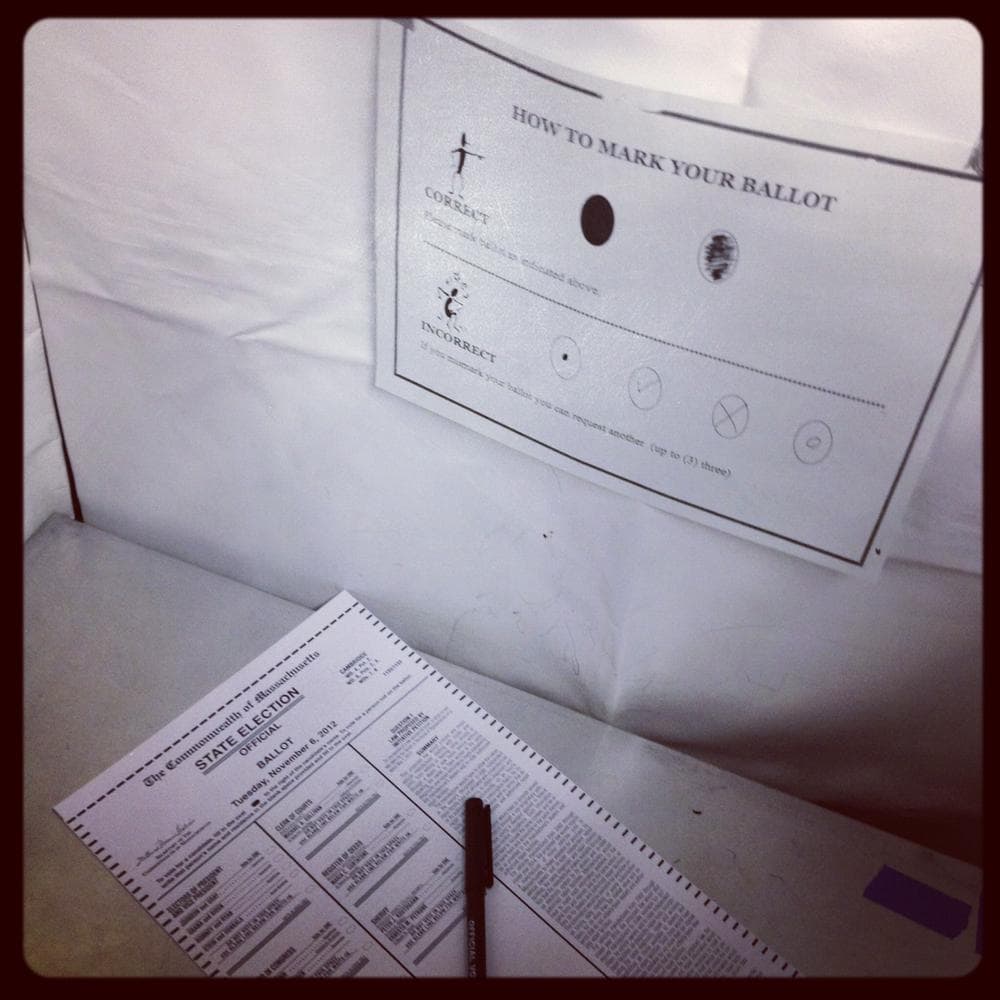Advertisement
That Photo Of Your Ballot You Posted On Social Media? It's Against Mass. Law

As Massachusetts voters head to voting centers, many are taking to social media to express feelings of pride or excitement for getting the chance to vote. For some, that simply means tweeting that they voted, or posting a Facebook status urging their peers to vote, too. But many are also posting photos of their marked ballots to various social media platforms.
I voted. Did you? #Obama2012 twitter.com/SethAMcCoy/sta…— Seth McCoy (@SethAMcCoy) November 6, 2012
According to the Secretary of State's interpretation of the Massachusetts General Law, taking that photo and sharing it is illegal. However, many people are unaware of the law, and there’s even a trending hashtag #showmeyourballot showing photo after photo of marked ballots. Even Boston City Councilor Tito Jackson tweeted a photo of his ballot, but has since removed the photo from Twitter. Boston Phoenix staff writer David Bernstein also tweeted a picture of his marked ballot, and shortly after received a phone call from the Office of the Secretary of Commonwealth advising him to take the photo down. Here is the tweet Bernstein sent out after the takedown advisory:
Office of the Secy of the Commonwealth has called to advise me that it's illegal in Mass. to Tweet a picture of your marked ballot. #mavote— David S. Bernstein (@dbernstein) November 6, 2012
Bernstein said that, after asking around, he's come to understand that the law stems from the state not wanting people to buy votes. "The idea being if someone was buying your vote, you'd take a picture to show that you voted for who they wanted you to vote for," Bernstein said. "So you could see the thought behind it in that sense."
Listen to the full conversation with Bernstein here:
The full law says:
Whoever, at a primary, caucus or election, places any distinguishing mark upon his ballot, or makes a false statement as to his ability to mark his ballot, or allows the marking of his ballot to be seen by any person for any purpose not authorized by law, or gives a false answer to or makes a false oath before a presiding officer, shall be punished by imprisonment for not more than six months or by a fine of not more than one hundred dollars.
A lot of conversation is happening around the law itself, with some noting that the law is an interpretation by the the Secretary of State's office and should be treated as such.
Massachusetts is just one of many states that has a law about publicizing marked ballots, and Citizen Media Law Project has done a good job laying out the varying laws state by state.
While Massachusetts’ law does not explicitly state the use of cellular phones, the secretary of state has issued an Election Day Legal Summary, a document that addresses “common situations that may arise on Election Day.” The summary includes the regulation that “observers may not use cellular telephones within the polling place.” So not only is taking photos not allowed, but using cellphones isn't allowed either.
In a phone conversation with WBUR, Secretary of State William Galvin said that, according to his office, photographing your ballot is indeed illegal, but added that pursuing offenders isn't too high on their priority list today.
"It's not a serious violation," Galvin said. "There is a statute that says you shouldn't do it and you shouldn't. We go to great lengths to protect the privacy of voters. However, we have better things to do today than pursue those types of cases."
A new report by Pew Research says that 22 percent of registered voters let others know who they voted for on a social network.
